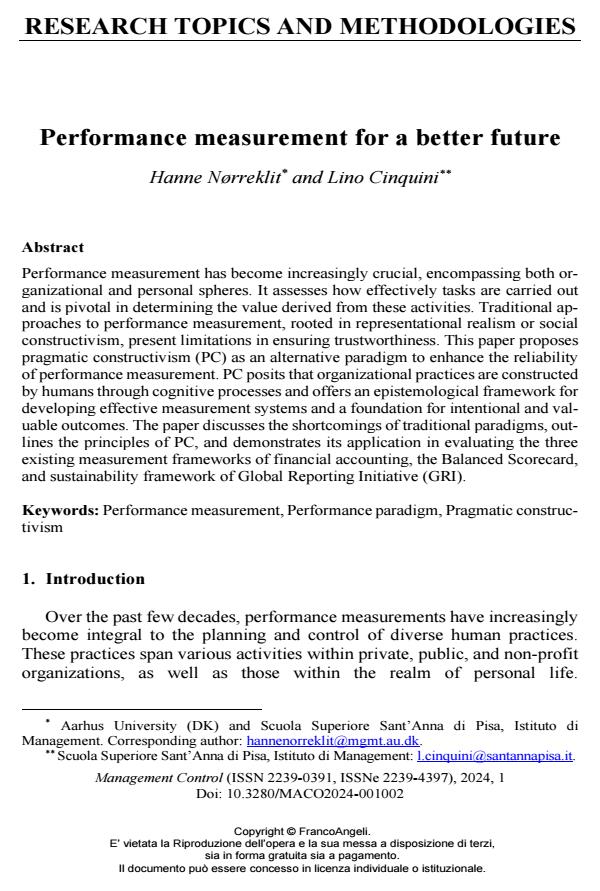Performance measurement for a better future
Titolo Rivista MANAGEMENT CONTROL
Autori/Curatori Hanne Norreklit, Lino Cinquini
Anno di pubblicazione 2024 Fascicolo 2024/1
Lingua Inglese Numero pagine 24 P. 15-38 Dimensione file 275 KB
DOI 10.3280/MACO2024-001002
Il DOI è il codice a barre della proprietà intellettuale: per saperne di più
clicca qui
Qui sotto puoi vedere in anteprima la prima pagina di questo articolo.
Se questo articolo ti interessa, lo puoi acquistare (e scaricare in formato pdf) seguendo le facili indicazioni per acquistare il download credit. Acquista Download Credits per scaricare questo Articolo in formato PDF

FrancoAngeli è membro della Publishers International Linking Association, Inc (PILA), associazione indipendente e non profit per facilitare (attraverso i servizi tecnologici implementati da CrossRef.org) l’accesso degli studiosi ai contenuti digitali nelle pubblicazioni professionali e scientifiche.
Performance measurement has become increasingly crucial, encompassing both organizational and personal spheres. It assesses how effectively tasks are carried out and is pivotal in determining the value derived from these activities. Tradition-al approaches to performance measurement, rooted in representational realism or social constructivism, present limitations in ensuring trustworthiness. This paper proposes pragmatic constructivism (PC) as an alternative paradigm to enhance the reliability of performance measurement. PC posits that organizational practices are constructed by humans through cognitive processes and offers an epistemolog-ical framework for developing effective measurement systems and a foundation for intentional and valuable outcomes. The paper discusses the shortcomings of traditional paradigms, outlines the principles of PC, and demonstrates its applica-tion in evaluating the three existing measurement frameworks of financial accounting, the Balanced Scorecard, and sustainability framework of Global Report-ing Initiative (GRI).
Parole chiave:Performance measurement, Performance paradigm, Pragmatic constructivism
- Sustainability performance measurement systems: a systematic literature review and research agenda for (a better) future Gianluca Vitale, Alberto Rosignuolo, Angelo Riccaboni, in Measuring Business Excellence /2025 pp.609
DOI: 10.1108/MBE-09-2024-0155 - L'evoluzione e il ruolo dei sistemi di controllo diagnostico nel contesto "agile" Bruno De Rosa, in MANAGEMENT CONTROL 3/2026 pp.161
DOI: 10.3280/MACO2025-003008 - Il problema dell'integrazione: mezzo e fine del controllo di gestione Antonio Leotta, in MANAGEMENT CONTROL 3/2024 pp.5
DOI: 10.3280/MACO2024-003001 - Performance Management Systems in Micro, Small, and Medium Enterprises: Lessons learned from Times of Uncer Laura Broccardo, Elisa Ballesio, Edoardo Crocco, Daniele Giordino, in MANAGEMENT CONTROL 3/2024 pp.15
DOI: 10.3280/MACO2024-003002
Hanne Norreklit, Lino Cinquini, Performance measurement for a better future in "MANAGEMENT CONTROL" 1/2024, pp 15-38, DOI: 10.3280/MACO2024-001002